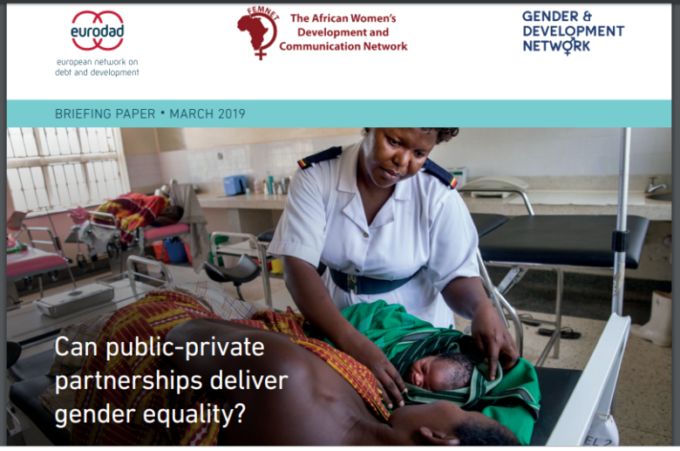
Can public-private partnerships deliver gender equality?
Public-private partnerships (PPPs) are being actively promoted by donor governments and international financial institutions to finance social services and infrastructure projects around the world. They feature prominently as a financing mechanism for delivering the Sustainable Development Goals (SDGs). However, support for PPPs runs counter to governments’ commitments to promote gender equality and the fulfilment of women’s rights under Agenda 2030 and elsewhere. PPPs are agreements that see private sector companies essentially replacing the state as providers of traditional public services and infrastructure, such as health and education, transport, energy, and water and sanitation. Proponents point to their value in raising resources and introducing efficiency, which in turn will lead to the achievement of social goals like gender equality. But their evidence is weak. In fact, the available research suggests that PPPs may actually exacerbate gender inequality.
This Policy Brief by FEMNET, GADN and Eurodad argues that international financial institutions and their member governments should stop the ideologically driven promotion of PPPs. If donors and governments are to meet their obligations on gender equality and women’s rights, we need a much more evidence-based approach to the way in which social services and infrastructure are financed. Financing mechanisms should contribute to, and not undermine, gender equality and other social goals within Agenda 2030.
Critical Recommendations that governments and international financial institutions should do so as to honour their commitments to promote gender equality and women’s rights include:
- State responsibility: International financial institutions and governments must recognize that states are responsible for meeting international commitments and obligations on gender equality and women’s rights, such as under Agenda 2030 and CEDAW, including through the provision of gender transformative public services. This role must not be transferred to private corporations
- Evidence-based approach: The financing mechanisms chosen to deliver social services and infrastructure should be assessed for their ability to ensure cost-effectiveness, accessibility and quality gender-transformative services. International financial institutions and governments should build the evidence base through gender impact assessments. These studies should consider impact on both the expansion of coverage (quantity) and on
the affordability, accessibility and appropriateness (quality), at all stages: design, implementation, monitoring and assessment in all projects. - Domestic resource mobilization: To ensure governments have a genuine choice in finding the best financing mechanism for gender transformative social services, donors should support the prioritization of progressive taxation at the national and international level, curb tax dodging, and provide long-term concessional finance through soft loans.
- Compliance with human rights standards: When working with private sector partners, governments and international financial institutions must enforce a strong regulatory framework requiring periodic
evaluations in relation to environmental, social, human rights and gender equality standards for
PPPs. A guarantee of compliance with international human rights law and ILO standards, including
women’s human rights, should be built into contracts. - Transparency and accountability: For all PPP funded projects, international financial institutions and governments must ensure that rigorous transparency standards are applied, particularly with regard to accounting of public funds, and disclosure of contracts and performance reports. International financial institutions and governments must also ensure broad civil society participation before and during project implementation. This should be done through informed consultations, including the input of local communities and women’s rights organizations.
Click here to Download/ Read the Policy Brief: Can Public Private Partnerships Deliver Gender Equality?






